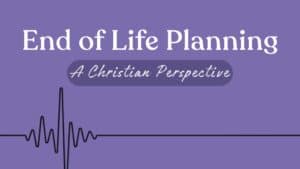Questions and Answers About Physician-Assisted Suicide
- What is physician-assisted suicide?
- Is physician-assisted suicide legal?
- Can patients refuse to have treatment and decide they want to die?
- Why do people commit suicide using drugs from a physician?
- What about someone who doesn’t want to be a burden to his family and friends?
- What’s wrong with a patient committing suicide if they are dying anyway and don’t want to suffer?
- What about expensive medical bills for treating disease?
- What about pain and other physical symptoms at the end of life?
- Can doctors be wrong about the diagnosis and prognosis?
Reasons to Oppose Physician-Assisted Suicide
Legalizing doctor prescribed death is much like putting fire into a paper bag: it cannot be controlled. Here are some reasons to oppose it:
- The “choice” of physician-assisted suicide is an illusion.
Laws allowing it are ripe for abuse. For instance, once the lethal prescription is handed to the patient, there is no accountability of what takes place next. A third party (including someone who stands to benefit financially from the patient’s death) could administer the drug to the patient without patient consent, even if the patient changed her mind and struggled against the overdose. Laws do not require consent at the time of death, only consent to obtain the lethal prescription – a distinction which can give someone other the patient the power to decide when death occurs. In reality, there is no protected “choice” as proponents claim.
For example, Sen. Ted Kennedy’s widow, Victoria, opposed Massachusetts’ 2012 ballot measure to legalize assisted suicide, saying it would turn her husband’s “vision for health care for all on its head by asking us to endorse patient suicide – not patient care- as our public policy for dealing with pain and the financial burdens of care at the end of life. We’re better than that.”
- Physician-Assisted Suicide is not a private, personal act.
Doctor prescribed death involves more than the patient. It necessitates a host of participants, including a doctor, a pharmacist and the state. It’s a public act that requires medicine, law and society approve a lethal prescription that crosses the line between caring and killing.
- Acceptance of physician-assisted suicide sends the message that some lives are not worth living.
Social acceptance of physician-assisted suicide tells elderly, disabled and dependent citizens that their lives are not valuable. Doctors who list death by assisted suicide among the medical options for a terminally or chronically ill patient communicate hopelessness, not compassion.
- Physician assisted suicide creates legal opportunity for hidden elder abuse.
Elder financial abuse is a documented fact, costing victims an estimated $2.6 billion each year and can serve as a catalyst for other types of elder abuse. Society-approved death puts elders at risk for abuse through include being coerced, pressured or even forced into suicide.
- Doctor prescribed death compounds the discrimination experienced by people with disabilities.
Disability rights groups are some of the strongest voices against physician assisted suicide based on the experience of their community. According to disability rights leader, John Kelly, “As people with disabilities, we are already on the front line of a broken, profit-driven health care system which will naturally see a below $100 prescription as a cheaper alternative to experimental [and life extending] drugs.”
What’s to prevent a prescription from becoming the treatment of choice to offer terminally or chronically ill patients? Doctor prescribed death will always be the cheaper option.
- The practice of physician-assisted suicide creates a duty to die.
Suicide is not medical care.
Escalating health-care costs, coupled with a growing elderly population, set the stage for an American culture eager to embrace alternatives to expensive, long-term medical care. The so-called “right to die” may soon become the “duty to die” as our senior, disabled and depressed family members are pressured or coerced into ending their lives. At a time when health insurance coverage is in flux for millions of Americans (due to ObamaCare), discussions of legalizing doctor prescribed death seems especially dangerous. In a dollar-driven environment, it’s too tempting for death to become a reasonable substitute to treatment and care when medical coverage is uncertain and medical costs continue to rise.
In Oregon, at least two patients receiving medical care under the state-funded Oregon Health Plan report being denied chemotherapy but offered assisted suicide.
Story of Barbara Wagner
Story of Randy Stroup
- There are better medical alternatives.
Palliative Care specialist, Dr. Dan Maison, says, “One phrase that gets under my skin and breaks my heart is when someone says, ‘Well, they told me there is nothing more they could do.’ There’s always more we can do.” Regarding Brittany Maynard, “”Actually, we take care of folks like her all the time, and we’re able to keep almost all of them very comfortable,” he said.
- The practice of physician-assisted suicide threatens to destroy the delicate trust relationship between doctor and patient.
Every day patients demonstrate their faith in the medical profession by taking medications and agreeing to treatment on the advice of their physicians. Patients trust that the physicians’ actions are in their best interest with the goal of protecting life. Physician-assisted suicide endangers this trust relationship by making physicians actors in a patient’s death.
Focus FAQs
Aging Loved Ones and Physician-Assisted Suicide














